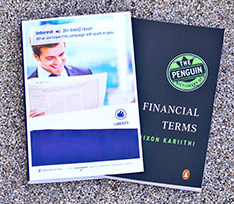Financial terms can be confusing especially when it comes to reporting on economics or market returns. Just as confusing is the language used by insurance and retirement polices, yet understanding the difference between a beneficiary and a dependant can have a significant implication on a death benefit claim for example.
Here are some of the more common financial terms you will come across:
Policies
Beneficiary: A person (or trust) who will receive proceeds from a policy or investment if you die.
Dependant: A person who relies on another, especially a family member, for financial support. In some cases a dependant can have a claim on a policy or retirement fund even if they are not a beneficiary.
Invalidate: To make a contract, agreement, document etc., invalid, e.g. failure to follow the instructions correctly could invalidate the guarantee.
Loading: An extra amount you may need to pay for insurance in addition to a premium. For example you have heart disease but want life insurance. The Insurance company will assess you to be a high risk, and charge you a high premium made up of the basic rate plus a loading.
Underwrite: To guarantee against financial risk by assuming that risk, as financial institutions do when they offer (underwrite) an insurance policy, or when they buy a new securities issue from the issuer for re-sale to the public.
Premium: The amount you pay, monthly or annually, for an insurance policy.
Quote: An estimation of the cost you will pay for a policy, and/or the value of that policy in future years.
Investing
The market: This usually refers to the stock market, a place where shares of companies are bought and sold.
Return on equity (ROE): A measure of how well a company uses shareholders’ funds to generate a profit. This is expressed as a percentage of net profit to net assets.
Dividend yield: Annual return from holding a stock, determined by dividing the company’s total dividends of the year by the current share price.
Rand cost averaging: A system of accumulating shares or investment fund units by investing a fixed amount of money at set intervals. This means the investor buys more shares/units when the price is low, an fewer when the prices is high. The theory is that this is less costly than a system that involves buying a fixed number of shares/units at set intervals.
Nest egg: An amount of money that you save to use later, especially for your retirement.
Umbrella fund: A fund that is made up of a number of different investments. EXAMPLE: The introduction of the national pension scheme will lead to a shake-up in the private pension fund industry, in which 80% of the funds have fewer than 100 members. It is likely such small funds will merge to form umbrella funds that cover multiple employers before the national scheme is implemented.
Economy and markets
Retail therapy: When people go shopping in order to feel better, rather than because they really need to buy things.
Purchasing power parity (PPP): Method of currency valuation based on the premise that two identical goods in different countries should eventually cost the same. This is illustrated by the Big Mac index which takes a Big Mac hamburger and compares its prices in different countries in order to establish the relative value of their currencies.
Flight to quality: When investors move their funds to more secure/less risky assets during a particularly volatile period in the markets or because of political or economic instability.
Buyer‘s market: A market that favours buyers because supply is plentiful relative to demand and therefore prices are relatively low. The opposite of a seller’s market.
Soft landing: When an economy that has recorded a period of very rapid growth slows down gradually without experiencing the negative effects of a more abrupt reversal.
Some words: Source, The Penguin Dictionary of Financial Terms
 |
WIN!
Two lucky Liberty customers can each win a copy of The Penguin Dictionary of Financial Terms by Nixon Karimi Kariithi. Simply email your contact details to [email protected] by 25 August 2016. Winners will be contacted directly. |
|